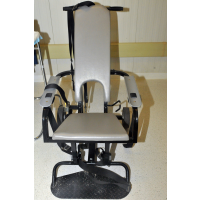Guantánamo Hunger Strikers Ask for End of Force Feeding during Ramadan
 Guantanamo force-feeding chair (photo: Army Sgt. Brian Godette)
Guantanamo force-feeding chair (photo: Army Sgt. Brian Godette)
Because the Quran enjoins the faithful to fast from sunup to sundown during the holy month of Ramadan—which begins this year today, July 8—four detainees at the U.S. military prison at Guantánamo Bay, Cuba, have filed suit demanding the government halt the force-feeding of at least 45 Muslim prisoners there. More than 100 of the 166 detainees are on a hunger strike that began in February as a protest of open-ended detentions, lack of due process, and torture, including solitary confinement.
The four named plaintiffs—Shaker Aamer, Nabil Hadjarab, Ahmed Belbacha, and Abu Wa’el Dhiab—were cleared for release from Guantánamo in 2010, yet remain incarcerated with no end in sight. All four are on hunger strike, and only Aamer is not currently being force-fed. All four have filed habeas corpus petitions, either before Judge Rosemary Collyer or Judge Gladys Kessler, both in Washington, DC.
Denying allegations that the force-feeding will violate the detainees’ religious freedoms under the 1993 Religious Freedom Restoration Act and the Geneva Conventions, Col. Greg Julian, public affairs director for US southern command, told Britain’s Guardian newspaper “we do not force-feed observant Muslims during daylight hours during Ramadan. These policies have been in place for years, and are consistent with our mission to safely detain while supporting the religious practices of those in US custody.”
But attorneys representing the detainees issued a public statement echoing a warning in the complaint that “because dozens of Guantánamo Bay detainees are currently being force-fed, it might very well prove to be logistically infeasible to conduct twice-daily force-feedings only at nighttime.”
“Based on Guantánamo authorities’ own numbers, there will be just 10 hours and 44 minutes [between sunset and sunrise] for respondents to implement two force-feedings of 45 detainees for up to an hour of feeding time and four hours of total observation time per detainee which could require dozens of restraint chairs and hundreds of staff. If this can even be achieved, Guantánamo Bay will become a veritable force-feeding factory.”
In addition, the complaint charges that, as part of the force-feeding procedure, the government is forcibly dosing detainees with a drug that can cause serious neurological disorders, including tardive dyskinesia, which are involuntary movements similar to those in Parkinson’s disease. The drug, metoclopramide, popularly known as Reglan, is supposed to speed up digestion and reduce nausea caused by force-feeding. According to the FDA, Reglan can also cause depression, suicidal thoughts and suicide.
Although the revised Guantánamo force-feeding policy implemented in April recommends medical personnel administer Reglan, the government denies that Reglan is being administered to detainees.
-Matt Bewig
To Learn More:
Gitmo Hunger Strikers to Face 'Force-Feeding Factory' During Ramadan (by Sarah Lazare, Common Dreams)
Guantanamo Prisoners Ask Judge To Stop Force-Feeding So They Can Observe Ramadan (by Jason Leopold, Public Record)
Lawyers Ask Judges to Halt Guantánamo Forced-Feedings (by Carol Rosenberg, Miami Herald)
Gitmo Hunger Strikers Decry Force-Feeding (by Lorraine Bailey, Courthouse News Service)
Why are More Than Half of Guantánamo Prisoners now on Hunger Strike? (by Matt Bewig, AllGov)
- Top Stories
- Unusual News
- Where is the Money Going?
- Controversies
- U.S. and the World
- Appointments and Resignations
- Latest News
- Trump Renames National Football League National Trump League
- Trump to Stop Deportations If…
- Trump Denounces World Series
- What If China Invaded the United States?
- Donald Trump Has a Mental Health Problem and It Has a Name






Comments